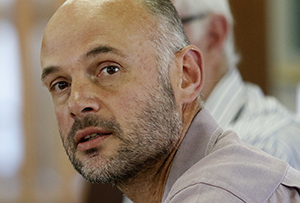Latest News Archive
Please select Category, Year, and then Month to display items
08 April 2021
|
Story Thabo Kessah
|
Photo UFS Photo Archive
 Dr KPD Maphalla with former UFS Chancellor, Dr Franklin Sonn, during the graduations in April 2007.
Dr KPD Maphalla with former UFS Chancellor, Dr Franklin Sonn, during the graduations in April 2007.
The University of the Free State is sad to learn of the passing of alumnus and award-winning Sesotho literary giant, Dr KPD Maphalla.
The literary works of Dr Khotso Pieter David Maphalla, like many other African writers and artists, were influenced and characterised by his own era of powerful forms of oppression and exclusion from dominant literary discourses. In his own right and through his writings of poetry, novels, short stories, and kodiamalla (dirge), he articulated a deliberate political and social protest and pushed for a place for African languages in literature at the height of apartheid.
“He entered the professional scene with his ground-breaking novel, Kabelwamanong, in 1982 at the age of 27. His career actually started in 1971 while he was still at school. Since his first novel, he has produced at least two books annually, covering the genres of poetry, novels, dramas, and short stories. As a dramatist, Dr Maphalla has written a number of excellent and educative radio dramas for the then Radio Sesotho (now Lesedi FM),” said his long-time friend and Head: African Languages at the University of the Free State, Dr Nyefolo Malete.
“It was for this writing prowess that he received recognition from the UFS when he was awarded an Honorary Doctorate in Literature by the Department of African Languages during a momentous ceremony on the Qwaqwa Campus in 2007,” added Dr Malete.
Dr Malete also revealed that, despite losing the use of his right hand after suffering a stroke following a car accident in the late 1990s, Dr Maphalla continued writing using his left hand. “He was adamant that, what he referred to as his ‘supposed disability’, would not deter his passion for writing.”
Dr Maphalla’s work has also produced numerous scholarly studies by the likes of Profs Moleleki Moleleki (protest poetry), Thapelo Selepe (lament and protest poetry), and Dr Seema Seema (process of cross-cultural communication). He was a committed Qwaqwa community member, who was also instrumental in the founding of Qwaqwa Community Radio (2000) and Metjodi Writers (2006), among others. He has written more than 70 books, many of which have been prescribed texts in schools.
Some of the awards he has won include:
South African Centre for Digital Language Resource (SADiLar) Sesotho Lexicographic Unit (Sesiu sa Sesotho) Lifetime Award for outstanding literary works and for promoting Sesotho literature (2019).
The Literature Festival and the University of the Free State Award for enormous contribution to Sesotho literature by a South African writer (2019).
Lifetime Achiever Award in Literature awarded by the Department of Arts and Culture (2005).
M-Net Book Prize for Sesotho poetry (2005). The first and thus far the only Sesotho author to have received this honour.
M-Net Book Prize for best novel (1996).
De Jager-HAUM Literary Award for his volume of short stories, Mohlomong Hosane (1993).
Thomas Mofolo Trophy for Best Novel, Best Poetry, and the Overall Award (1992).
Thomas Mofolo Trophy for Best Poetry (1991).
Dr JJ Moiloa Floating Trophy for Best Sesotho Poetry Book of the Year, Kgapa tsa ka (1985).
Lecturer’s debut novel wins ATKV Prize for Fiction
2015-10-14

Dr Francois Smith
Photo: Johan Roux |
Kamphoer made its debut on the literary scene just over a year ago, and on 11 September 2015, it was declared the best novel by the Afrikaanse Taal en Kultuurvereniging (ATKV). This is not the first time Kamphoer has been recognised as literary gem. Earlier this year, the novel was shortlisted for the W A Hofmeyr Prize as well as the Huisgenoot Tempo Award.
Dr Francois Smith, the author, joined the University of the Free State (UFS) as a lecturer in the Department of Afrikaans and Dutch, German and French at the beginning of this year. Prior to entering the academic sphere, he dedicated about 11 years of his life to editing for a publishing house. Certainly, helping other people write and produce books thoroughly prepared him for authorship.
For three months, Smith spent eight hours a day creating his award-winning masterpiece. The secret of success lies in the ABC formula. “The ABC for writing is Apply Back to Chair. You have to go and sit down and start typing,” he says.
That is when passion meets imagination, albeit at times, one might also need inspiration. Smith applied this winning formula meticulously, and it has resulted in over 30 000 copies of Kamphoer being sold since July 2014.
He was taken aback by the novel’s warm reception. “I wrote a book, finished it, and knew that it wasn’t bad but I never for one moment imagined that it would be such a big commercial success,” he said.
About Kamphoer
The book which Smith describes as a good but not an easy read about a disturbing subject is the true story of a woman who was brutally raped during the South African War and left for dead. After the traumatic experience, she dedicates her life to helping others deal with similar ordeals, re-encountering her rapists in the process.
About the award
Kamphoer emerged as an exceptional contribution amongst two other finalists. Kerneels Breytenbach’s Ester as well as Harry Kalmer’s ’n Duisend stories oor Johannesburg were also competing for the prestigious award.